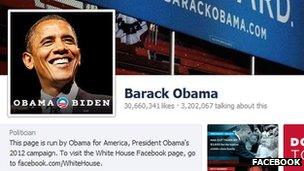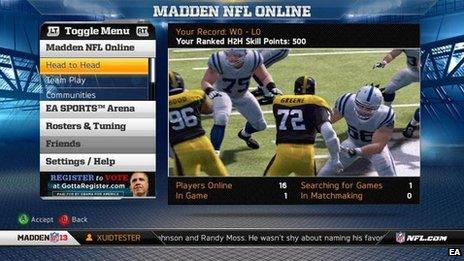Barack Obama Facebook campaign sees 'likes' soar
- Published

Barack Obama's Facebook page has attracted over 30 million likes since his time as a presidential nominee
US President Barack Obama has enjoyed a surge in Facebook "likes", thanks to a co-ordinated social media campaign.
His team paid for "Sponsored Stories" to appear in some users' Facebook news feeds - regardless of whether they wanted to receive them.
President Obama's page received more than one million "likes" in a single day - compared with about 30,000 per day in earlier weeks.
But some observers warned the approach could frustrate and dissuade voters.
It comes at a time when both President Obama and Republican candidate Mitt Romney are stepping up their efforts on social media.
The opponents each have a presence on a host of digital communities, including streaming music service Spotify, image-sharing network Pinterest and the Facebook-owned picture network Instagram - where Mr Romney has been busy posting pictures of himself at home with his family, external.
But users were quick to voice their annoyance as President Obama campaign advertisements and messages appeared within Facebook news feeds.
"Why is Barack Obama on my Facebook newsfeed?" wrote a young female user from Illinois.
"I'm getting really sick of those Obama ads sponsored on my Facebook page," wrote another.
One user, in a message directed at President Obama's Twitter account, demanded: "Quit trying to promote yourself on my Facebook and Twitter feeds. I never 'liked' or 'followed' you."
Dr Sandra Gonzalez-Bailon, from the Oxford Internet Institute (OII), told the BBC that this kind of campaigning was part of a transition period - which Facebook users may take some time to get used to.
"Before there were physical spaces where people discussed politics - the public sphere has been reconfigured," she said.
Winning streak
The growth comes as President Obama and Mr Romney look to ramp up their use of digital and social media ahead of November's vote.
In 2008, President Obama's campaign was praised for its innovative use of social media to engage young, often first-time, voters.
This time around, the efforts have been stepped up a notch. Both candidates have invested in getting good placement on both Facebook and Twitter - with campaign teams placing ads that appear whenever a certain word, such as "debate", is searched for by a user.

President Obama ads appear within games, such as this American Football title
President Obama took to answering questions on popular link listings site Reddit - a move that went down well with the site's clientele but was dismissed as a quick-win publicity stunt by his detractors.
The president has even had his team place adverts within video games. The top-selling American Football title - EA's Madden NFL 13 - had images advertising President Obama's website, voteforchange.com.
Other EA titles - including the classic Tetris - were also used to promote President Obama's campaign.
Mr Romney's campaign team told American broadcaster NPR they too had used video games for advertising.
Put off
Both campaigns would have hoped that swamping the digital world with their "message" was a surefire election hit. However, research conducted by the University of Pennsylvania suggested a different picture.
Of 1,503 internet-using American adults surveyed by the university's school of communications, 86% said they did not want to receive political messages tailored for them, and 70% said seeing ads from a candidate they already supported would in fact decrease their chance of voting for them.
"The findings represent a national statement of concern," said Prof Joseph Turow, lead researcher on the study.
"We have a major attitudinal tug of war - the public's emphatic and broad rejection of tailored political ads pulling against political campaigns' growing adoption of tailored political advertising without disclosing when they are using individuals' information and how.
"Our survey shows that in the face of these activities, Americans themselves want information."
The OII's Ms Gonzalez-Bailon said that politicians - and indeed anyone using social media to advertise - must be wary of a "red line" that should not be crossed when dealing with worries of intruding into people's private digital lives.
She recounted an incident in 2004 when Italy's then-prime minister Silvio Berlusconi's office sent out text messages reminding people to vote in upcoming elections - causing a political row in the process.
"Receiving a text message on your mobile was a way more serious transgression of your private sphere than seeing a sponsored ad on Facebook," she said.
- Published19 September 2012
- Published30 August 2012
- Published12 January 2012